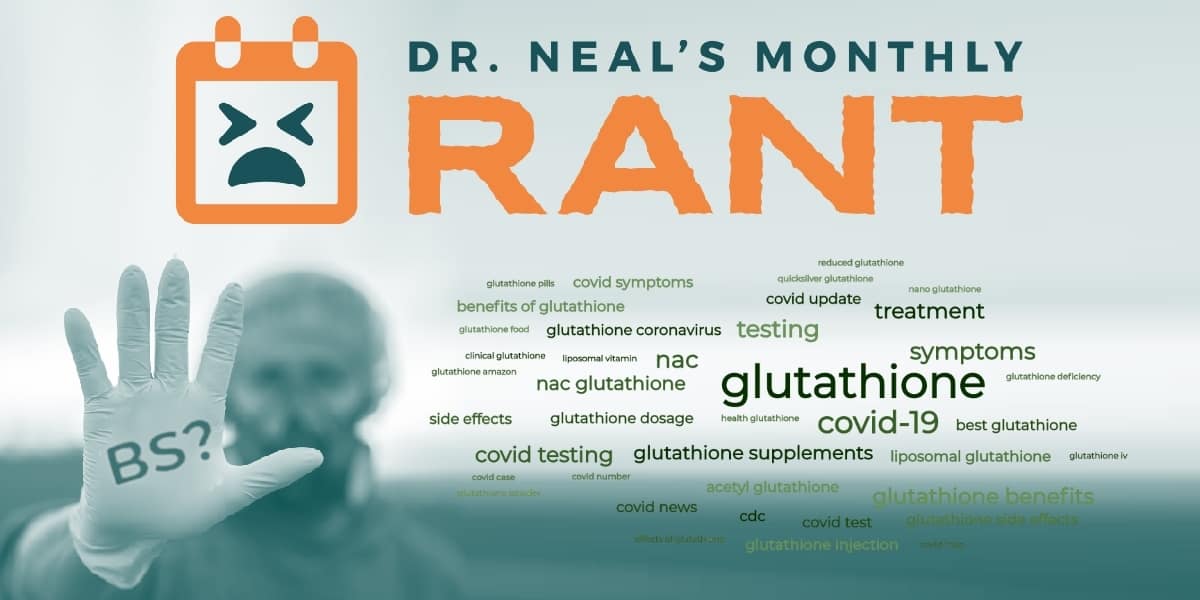A semi-notorious Hudson Valley physician recently gained some media attention touting his regimen for COVID.
I’m so tired of writing similar statements in blog posts, rants, podcast scripts, and social media posts.
I’m going to let Michael Scott tell you how I feel right now:






An integral part of the latest COVID non-cure were three antioxidants: glutathione, alpha-lipoic acid, and n-acetylcysteine (NAC).
Yes, someone has made me grumpy about glutathione.
I’m thinking a lot about Air Supply this week. I’m all out of love. I kinda want to choke the Air Supply out of these charlatans sometimes. I’m losing my Air Supply cry-screaming into my pillow every night as my arm grows tired of wack-a-misinformation-mole with every Tom, Dick, and Harry who has an opinion.
I want off this merry-go-round. I’m getting off. That does it. I’m not going to do the normal thing this month. I’m not going to spend 4 pages disproving any proposed benefit of each, today’s rant speaks more to the ideas around the regimen and less to the individual ingredients themselves.
We’re going to briefly introduce the trio and speak to quality faults, which of course they have, and then discuss all that I see wrong with the sour, watered-down, Las Vegas-overpriced COVID cocktail du jour.
We’ll close out this rant with me checking under your bed for monsters.
Grumpy About Glutathione
This rant is a follow up to my recent podcast where I talked about glutathione and this doc’s regimen at length.
To me, the regimen stunk so bad I smelled it all the way up the Hudson River. But, unfortunately, the folks writing the articles and the subsequent wave of charlatans that grabbed onto this cocktail were all in.
As a result, the products started to sell.
Here’s what happened:
- Dr. So and So published a case study about how 2 of his patients didn’t need hospitalization
- He suggests it’s because of his unique regimen which has unique inflammation-fighting properties
- The regimen is: hydroxychloroquine, azithromycin, zinc, and the trio he’s speaking the most about, glutathione, n-acetylcysteine, and alpha-lipoic acid.
I should clarify: I’m not grumpy about glutathione. I’m grumpy about the worship of a supplement and the messaging around its use.
First, the messaging. I’ve stated a few times now that the old attention-grabbing tricks using pseudoscience or half-truths are VERY effective during a panic-inducing pandemic. Therefore, they’re getting used heavily.
At a time where we should be collectively circling the wagons and casting out snake oil salesmen, a chunk of the population turn their nose up at the experts (or make death threats to them) and listen to someone with a Youtube channel.
Second, the worship. Glutathione’s an important background biological compound. INSIDE our body. There is little real evidence that adding it INTO our body in amounts over what we should already have, as a result of healthy choices, will do anything for most of us.
Similar to my thoughts on Vitamin C worship, we should not be so focused on micromanaging our micronutrients, and instead, live healthy lives and reserve supplements for when the data is real.
Let’s talk about the three supplements from this cocktail a bit more.
What is Glutathione, Alpha Lipoic Acid, and NAC?
Simply put, all of these compounds are antioxidants. I recommend reading a past rant, Let’s Anti-Our-Oxidants for the deep dive.
Our body is in a balance between waste products and garbage cans. If we have more waste than garbage cans, bad stuff happens. We need to ensure our garbage can supply is ample.
By eating healthy and avoiding unhealthy habits, we create a general state of reduced oxidation.
Glutathione is a very active and important antioxidant in the body. It’s made up of 3 amino acids, the most important being cysteine.
Amino acids, if you recall, are the building blocks of proteins. We eat proteins, the amino acids get into our blood. Our body then stores most of them and uses them to build all the protein-related things it needs. Amino acids are constantly used and recycled, but we have to maintain an abundant supply via our diet.
Cysteine-rich proteins are things like eggs, beef, pork, lentils, sunflower seeds, and dairy.
If you eat enough of these, you’ll have plenty of glutathione being made. There are two main groups of people who will have a glutathione deficiency: those who overdose on acetaminophen and those with chronic liver disease (like cirrhosis). Otherwise, glutathione deficiency would be due to malnutrition.
The thing is, most people don’t eat nearly enough protein. One could argue we need more glutathione because of that, but that’s not true either. We just need to eat more protein. This goes double for diseases where glutathione could be depleted, like heart disease, lung disease, diabetes, age, and more.
Even if we wanted to supplement with glutathione, that compound is poorly absorbed. Glutathione found in foods is barely absorbed and the same goes for supplements. Because of this, most supplement companies sell liposomal glutathione or promote injections or even inhalations of glutathione.
Liposomal glutathione and other products like our Glutathione Absorb are expensive. Unless you pony up the dough, you’re probably wasting your money.
There’s an indirect route towards improving glutathione levels: cysteine. If that’s the lynchpin to the whole thing, it makes sense taking more would help. N-acetylcysteine (NAC) is how you can get cysteine without eating protein.
Cysteine itself, and therefore NAC, has some direct antioxidant effects in the body, too.
Alpha-lipoic acid is another antioxidant that’s found in red meat, beets, and dark greens like spinach and broccoli.
We know that antioxidants beget more antioxidants; if we eat foods rich in antioxidants like fruits and veggies, we’ll be exponentially healthier.
There’s some kind-of-sketchy data that links your body’s glutathione levels to benefits around cold and flu viral infections.
I don’t have to spend time debunking it because the Oxford COVID-19 evidence team did a review of the glutathione and NAC literature when this topic started, and… surprise surprise… found no evidence. Specifically, they found:
- There were no concluded trials of NAC, glutathione, and ALA on COVID
- The only available literature was on cold and flu trials
- The cold and flu trials were sketchy at best and can’t help us make decisions
Therefore, the real experts—not a Hudson Valley doctor with an axe to grind—have concluded that these are NOT worth exploring.
Can Glutathione, NAC, or Alpha Lipoic Acid Help COVID?
Right now, the answer is probably not.
Part of the problem is when you look at papers or articles written on the subject, you’ll see phrases like “glutathione boosting treatments have been shown to enhance immune responses and reduce the severity of influenza, coronavirus, HIV, and other viral infections” and that there is a “substantial body of evidence” around glutathione’s benefit.
Here’s a truth we have to realize today: white papers rarely give you answers, but always give you homework.
There’s no evidence that micromanaging inflammation in our body beyond good nutrition, weight management, and chronic disease minimization will have any benefit in anything COVID related. Meaning preventing it, stopping hospitalizations, and preventing death.
When folks are diagnosed now, especially in the hospital, some are put on high dose steroid regimens. These are like nuclear warheads compared to antioxidant supplements.
The only thing that will prevent COVID is mask-wearing, social distancing, and handwashing. Also, not going to school in Georgia. Or Florida. Or at Notre Dame. Or at all of these places where cases explode despite us having all the information that it’s a bad idea, yet we push ahead anyway because of… I told myself I wouldn’t do this. Breathe.
We do know that Vitamin D will help reduce our risk of severe respiratory illness, and that seems true with COVID as well.
We also know that obesity is a great risk factor now, too.
I believe that if you commit to hitting protein goals, especially cysteine-rich sources, as well as eating varied fruits and vegetables rich in absorbable antioxidants, you’ll be doing more for your body than you could with supplementation.
If you aren’t optimizing your lifestyle choices via the Wellness Pyramid, no supplement can overcome those risks.
The Red Flags of the Glutathione Cocktail for COVID
I speak about how to discern truth in the scientific media in practically every past article I’ve written. My favorite analogy was my moldy bread analogy.
With glutathione and COVID, I see a bunch of moldy bread again.
There are a number of red flags to this story that you may glance over, in your excited rush to find an answer we all seek:
Hydroxychloroquine and Azithromycin, Plus Zinc
For me, this is the biggest red flag. This physician’s regimen included treatment methods that have been hardcore disproven, namely hydroxychloroquine.
These treatments have become partisan, which is ridiculous. They are dangerous, especially in combination and for extended periods.
Now this combination of Plaquenil-Zithromax is less about science and more about symbolism. This combo signals anti-establishment. It signals to some “government coverup” or suppression of information—and it does so regardless of your political affiliation.
You see, enough of this being mentioned here or there, especially tied to anecdotes from people of “authority” and a small sliver of our consciousness starts to believe it is real.
The Case Study
To his credit, he listed a case study. The skeptic in me believes that he did so not for the purity of science, but for what it signals to people who don’t know what case studies are.
To consumers, googling this ingredient and coming across a PubMed listing looks and sounds official. To people in science and medicine, we see it as an anecdote. Simply put, it’s just a story. It’s not even that, to be fair. It’s the pitch for a potential screenplay that could or could not turn out to be a decent story. It’s a hint that something might be worthy of inspection via small clinical trials.
Pair this with other white papers submitted to lower credibility journals around the ingredient or topic, and to the untrained eye, you have a pattern of expertise and authority. We become biased in favor of the author instead of viewing the data objectively.
The Doctor and the Patients
If you’re familiar with practitioners in alternative medicine, especially those who have a celebrity status, you know that only people with money can access them. Consultation services, diagnostics that aren’t covered, and a supplement regimen as a mainstay of treatment sold at the office all cost a significant sum.
This particular doctor treats the healthy and wealthy in an outpatient setting. His patients are more health-conscious and have resources to access top-level food and care. Therefore, they are probably also more likely to not die or get hospitalized from COVID.
The Statistics of the Whole Thing
Known as survivorship bias, we tend to focus on those who have successfully overcome some obstacle while ignoring those who have not.
How many people who have cancer have spontaneous remission? A reasonably significant number.
How many people who would have had spontaneous remission also did an “alternative” regimen during treatment? Probably a bunch. Steve Jobs wasn’t so lucky.
The point is that 2 patients that did well because they took some supplements should not surprise you. COVID is serious for a number of reasons, but we all know that most people survive it and many people don’t need the hospital.
Don’t point to the successes as “proof” of anything except that THOSE people did well. A doctor and a researcher DEFINITELY would know this. A successful marketer doesn’t care.
Glutathione Is His Thing
This doc has been going on and on about glutathione and the like for nearly decades now.
He’s constantly using glutathione for this or that treatment. He’s constantly telling us we’re missing out. He’s written about it extensively.
Yes, glutathione is important. Equally so, a broken clock is right twice daily.
Glutathione Doesn’t Have What We Seek
What is it that we want above all else in the face of a pandemic? I wrote about two things early on:
- A sense of security
- Control
Glutathione, this doctor, and his regimen can only give us a false sense of security and the illusion of control. Just like zinc lozenges, Vitamin A, Vitamin C, elk antlers, magic water, colloidal silver, and the laundry list of supplements the traveling preachers have tried to convince us to buy.
We consumers are not the only ones seeking something here.
The medical community wants answers: a strategy, an option, something to decrease the suffering, fear, and death.
I’m fairly certain no responsible practitioner or researcher is willing to look past anything that is plausible for two reasons. First, we’re in uncharted territory and every avenue must be explored—even ones we’ve ignored before.
Second, money. Whoever discovers an answer could receive accolades like none other. This year is going to need its own history book at this point, and who doesn’t want to have a chapter written about themselves?
The idea that “lamestream medicine” is ignoring supplements or alternative medicine is factually incorrect. We’ve looked and there’s not much if anything there.
Let’s not forget that this doctor is seeking something too. All of these “practitioners” are. Attention and trust are our modern currency. With so many people screaming “LOOK AT ME,” the ability to capture attention and give the air of authority is a skill set that separates the wheat from the chaff.
We all know the drill: healthy information is boring as hell and unsexy. You get the most attention by being anti-establishment or promoting the trendy. Make that misinformation sexy and seem credible to those who engage with it superficially, and you win the game.
The Buts, What Ifs, and Curiosity
I can say all of the above until I’m blue in the face, but even the smartest among you would say the following to me:
“If it won’t hurt me, why can’t I just use it… just in case.”
This is the beauty (and often the ugliness) of this industry. You’re all adults and you can certainly try anything.
In fact, in this situation, I encourage you to. If you want to use one of these compounds, by all means, do it.
“Wait, what?!? Neal, did you hit your head?
Nopers. I’m not different now. You are.
The reason I’m at this place is because it’s different now. Why? If you decided today to use one or all of these, it’s not because of some doctor, it’s because you’ve now learned all about the bias and the red flags.
You’re not convinced it will help because of misinformation, you’re taking it to hedge your bets. You understand the pitfalls of the products, and know there’s probably nothing there except for that false sense of security.
In other words, you’re being more strategic about it. We’ve all grown, haven’t we?
I beat the drum of supplement strategy louder than others out there. We must consume our supplements using a strategy, not grasping at whatever straws, spending money on the wrong forms and doses of products we don’t even know why we’re taking that we stay on for years.
PS, if that’s you, it’s time for a wellness consult.
If you decide you wish to add this to your regimen, I suggest the following:
- Ignore the glutathione and ALA. They are expensive and difficult to get right, and again, there’s nothing magical about the combination or any of the individual ingredients
- Take the NAC, but only use 600mg once daily. We generally lack cysteine-rich foods in our diet and it’s best to eat them, not mega-dose on supplements
- Forever remember WHY you started—”I take this for the off-chance it will help COVID”
- Stop taking the stuff after this eventually blows over in 2035
The Big Lesson
COVID has highlighted the flaws in our systems. In my world, it’s shown that there is nothing sacred.
Charlatans will believe their own rhetoric; their dreamed up cocktails helped people with whatever illness because they “know” they are smarter than the medical establishment.
It also illustrates to me that changing perspectives in consumers is a bigger uphill battle than I had thought.
The information-driven purchasing dynamic between the industry and consumers is uber-efficient, and at its heart, it succeeds because it plays on emotions, particularly fear.
The “ah-ha!” moment for me was when I realized I can’t win if I’m trying to list out the pros and cons, science, and facts and figures exclusively. I must become a fear fighter. I’m checking under your bed and telling you there is no monster.
I can look under your bed every night (or every week, in this case) and tell you there’s nothing to be afraid of, but it’s not until we, ourselves, recognize this that we can sleep sounder.
This system is broken, it’s stoking your fears, and it’s pointing towards very real monsters: cancer, dementia, heart disease, suffering, and death. Now, they point to COVID, too.
My methods, the Holistic Standard, and in particular the Wellness Pyramid, is kinda about science, but it’s really about monster-fighting. It gives you clarity and confidence, which allows you to not respond so emotionally to fear-based marketing.
While you can certainly keep your feet from dangling off your bed while you sleep – just in case – I suggest really understanding what’s real: the repeated viewing of scary movies and listening to horror stories isn’t helping you sleep better at night.
We must kill the wellness chaos. We must rise above the fear.
If we do so, will we not fall victim to the latest and greatest supplement scam.
Just trying to keep it real…

Neal Smoller, PharmD
Owner, Pharmacist, Big Mouth



